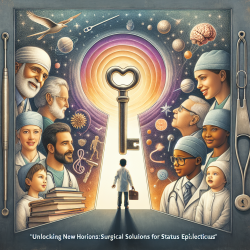The field of healthcare is complex and multifaceted, requiring professionals to navigate ethical dilemmas that often transcend disciplinary boundaries. The research article "iEthics: An Interprofessional Ethics Curriculum" sheds light on how an integrated approach to ethics education can significantly enhance the skills of practitioners by fostering interprofessional collaboration. This blog post will explore the key outcomes of this research and provide insights on how practitioners can implement these findings to improve their skills.
The Importance of Interprofessional Ethics Education
Ethics is a cornerstone of healthcare education, as it guides professionals in making informed and morally sound decisions. Traditionally, ethics education has been delivered within uni-disciplinary settings, limiting the exposure of students to diverse perspectives. However, the iEthics curriculum developed at the University of British Columbia (UBC) offers a novel approach by integrating interprofessional education (IPE) into ethics training. This approach not only enhances understanding but also prepares students for real-world scenarios where interdisciplinary collaboration is essential.
Key Components of the iEthics Curriculum
- Foundations of Ethical Practice: An online module followed by an interprofessional workshop that introduces students to ethical decision-making frameworks and professional codes of ethics.
- Ethical Decision-Making: A self-directed online module that delves deeper into ethical frameworks and applies them to complex cases.
- Interprofessional Ethical Decision-Making: A workshop that brings together students from various disciplines to discuss complex ethical cases, such as Medical Assistance in Dying (MAID).
- Moral Distress in Ethical Practice: An optional module focused on building moral resilience during ethical practice.
The Impact of Interprofessional Learning
The integration of interprofessional learning into the iEthics curriculum has shown significant benefits. Students from different health disciplines come together to explore ethical dilemmas, offering diverse perspectives that enrich discussions and lead to more comprehensive solutions. This collaborative approach fosters respect for different values and enhances the ability to work effectively in team-based care settings.
Evaluating the Success of the iEthics Program
The evaluation of the iEthics program revealed that over 83% of participants felt that the interprofessional approach enhanced their learning experience. Students appreciated the complexity of cases and valued the opportunity to engage with peers from other disciplines. The program's success underscores the importance of case-based learning and highlights how ethics can serve as a vector for interprofessional education.
Implementing Interprofessional Ethics Education in Practice
Practioners looking to enhance their skills can draw inspiration from the iEthics curriculum by incorporating similar interprofessional elements into their training programs. Here are some strategies to consider:
- Create Collaborative Learning Opportunities: Develop workshops or seminars that bring together professionals from different disciplines to discuss ethical cases.
- Utilize Case-Based Learning: Use real-world scenarios to challenge practitioners and encourage them to apply ethical frameworks collaboratively.
- Foster Open Dialogue: Encourage open discussions about personal and professional values, promoting mutual respect and understanding among team members.
The Future of Ethics Education
The success of the iEthics curriculum at UBC serves as a model for future interprofessional education initiatives. By integrating ethics as a core component across various health programs, educators can better prepare students for collaborative practice in complex healthcare environments. As practitioners continue to face evolving challenges, ongoing research and adaptation of educational models like iEthics will be crucial in maintaining high standards of ethical practice.
If you are interested in exploring this topic further or implementing similar strategies in your practice, consider reading the original research paper: iEthics: An Interprofessional Ethics Curriculum.










